Classical music festivals offer unique experiences that engage audiences and support local economies. Major events feature renowned performers and diverse programmes, showcasing orchestral and chamber music. Attendees enjoy immersive performances and educational workshops, enhancing their appreciation for the art form. Emerging trends like digital integration and sustainability are reshaping the festival landscape, attracting varied audiences and fostering community connections.
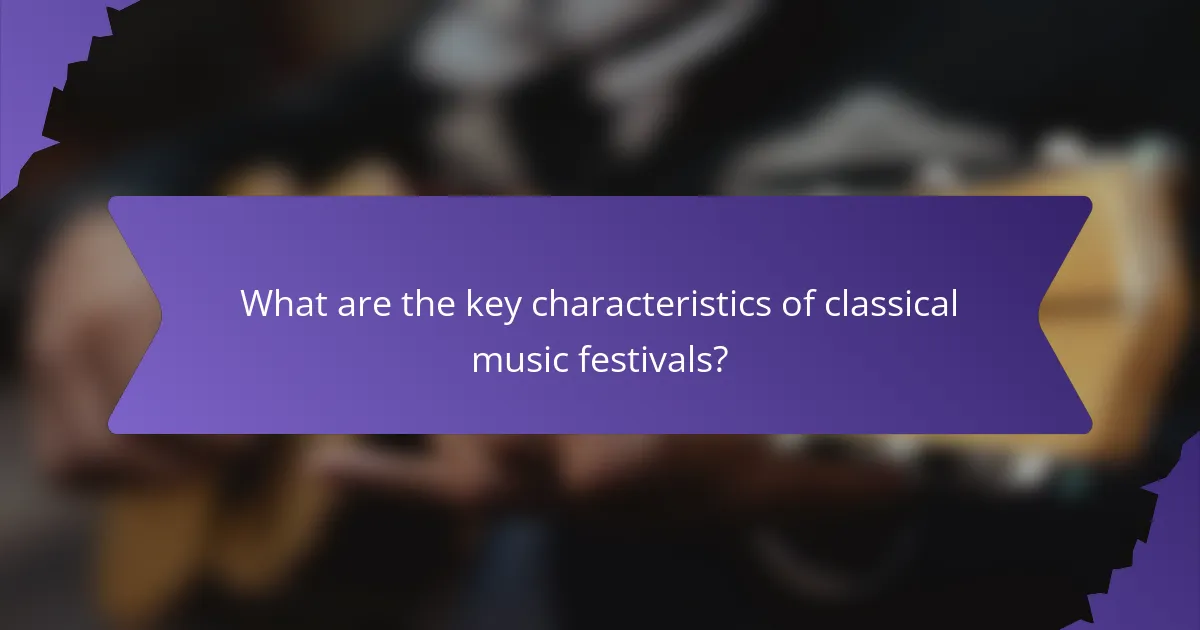
What are the key characteristics of classical music festivals?
Classical music festivals feature diverse performances, renowned artists, and unique audience experiences. Key characteristics include a rich programme of orchestral and chamber music, educational workshops, and community engagement. Festivals often highlight local culture and attract international talent, creating a vibrant atmosphere. The audience experiences immersive performances in scenic venues, enhancing appreciation for classical music.
How do classical music festivals vary by region?
Classical music festivals vary significantly by region due to cultural influences, musical traditions, and local preferences. For instance, European festivals often emphasise orchestral performances and opera, while North American festivals may focus on chamber music and contemporary works.
In Asia, festivals might blend traditional music with classical forms, showcasing unique instruments and styles. The audience experience also differs; European festivals may attract more formal attendees, whereas North American events often promote a casual atmosphere.
Regional climate and geography can impact festival duration and scheduling, with summer events being popular in temperate zones. Overall, these variations reflect the rich diversity within the classical music landscape.
What role do historical venues play in festival selection?
Historical venues significantly influence festival selection by providing unique atmospheres and cultural resonance. These sites often enhance audience experience through their architectural beauty and historical significance. Additionally, venues with rich histories can attract performers who seek to connect with tradition. For example, a classical music festival held in a historic opera house may draw larger audiences due to the venue’s prestige and legacy. This connection between the venue’s history and the festival’s theme can create a memorable experience, fostering a deeper appreciation for the music performed.
What is the significance of festival duration and scheduling?
Festival duration and scheduling significantly impact audience engagement and performer availability. Longer festivals allow for diverse programming and greater audience participation. Scheduling influences attendance rates, as weekends typically draw larger crowds. Additionally, strategic timing can enhance the overall experience, aligning performances with peak audience interest.
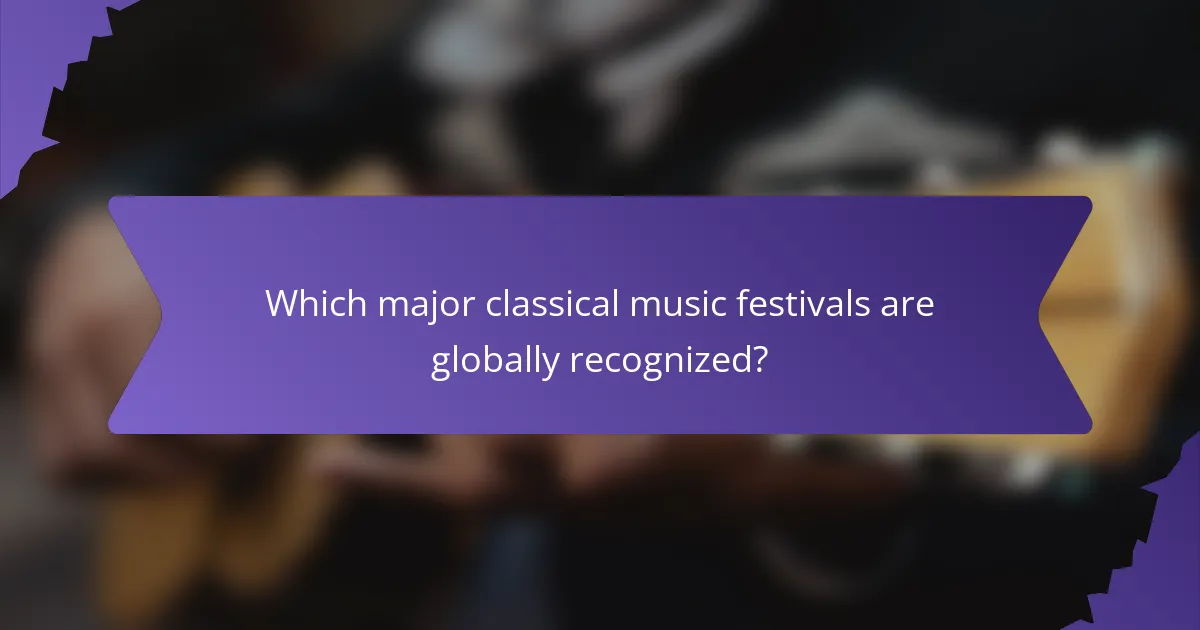
Which major classical music festivals are globally recognized?
Major classical music festivals recognized globally include the Salzburg Festival, Bayreuth Festival, Tanglewood Music Festival, and BBC Proms. These events showcase renowned performers and attract large audiences, enhancing the cultural landscape. Each festival offers unique experiences, from the operatic performances in Bayreuth to the orchestral concerts at Tanglewood.
How does the BBC Proms influence classical music culture?
The BBC Proms significantly shapes classical music culture by promoting accessibility and diversity. It introduces a wide range of performances, attracting varied audiences. The festival’s commitment to innovative programming influences both contemporary compositions and traditional works. Additionally, it fosters community engagement through outreach initiatives, enhancing public appreciation for classical music.
What makes the Salzburg Festival a unique experience?
The Salzburg Festival offers a unique experience through its stunning alpine setting, world-class performances, and rich cultural heritage. This annual event attracts top-tier classical musicians and opera singers, creating an unparalleled atmosphere. The festival features over 200 events, including operas, concerts, and theatrical performances, showcasing both renowned and emerging artists. Its commitment to artistic excellence and innovation sets it apart from other classical music festivals.
Which festivals are known for their innovative programming?
Notable classical music festivals known for innovative programming include the Salzburg Festival, Tanglewood Music Festival, and the BBC Proms. These festivals emphasise unique performances, interdisciplinary collaborations, and contemporary compositions. For instance, the Salzburg Festival often features modern operas alongside traditional works, while Tanglewood integrates various musical genres. The BBC Proms is renowned for its adventurous programming, showcasing both classical and contemporary pieces, often in unconventional venues.
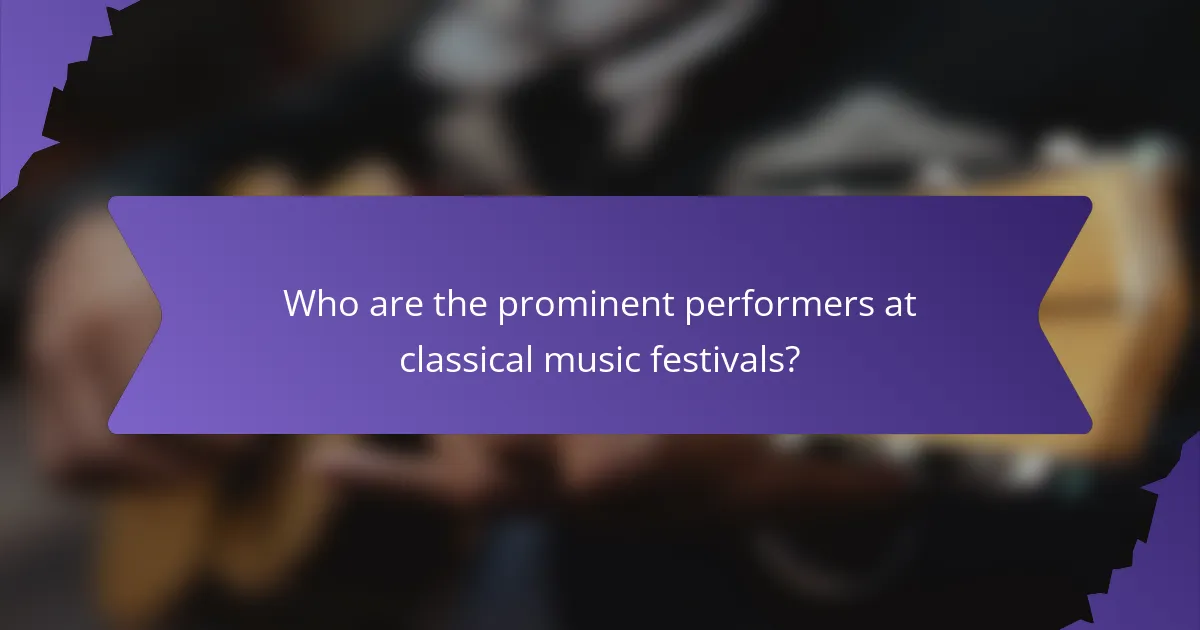
Who are the prominent performers at classical music festivals?
Prominent performers at classical music festivals include renowned orchestras, soloists, and conductors. Notable examples are the Berlin Philharmonic, violinist Itzhak Perlman, and conductor Gustavo Dudamel. These artists often showcase a mix of classic and contemporary works, enhancing the festival experience. Festivals like Salzburg and Tanglewood attract top talent, offering audiences a unique opportunity to witness exceptional performances.
What impact do soloists have on festival attendance?
Soloists significantly enhance festival attendance by attracting diverse audiences and elevating the overall experience. Their unique performances create a draw for classical music enthusiasts and casual listeners alike. For instance, renowned soloists can boost ticket sales by up to 30%, showcasing their impact on audience engagement. Festivals featuring prominent soloists often report increased visibility and media coverage, further amplifying attendance. The presence of these artists not only enriches the festival’s artistic quality but also fosters a vibrant community atmosphere, encouraging repeat attendance.
How do orchestras vary in their festival participation?
Orchestras vary in their festival participation based on size, repertoire, and regional focus. Larger orchestras often engage in prominent festivals, showcasing diverse classical works. Smaller ensembles may participate in niche festivals that emphasise local culture or specific genres. Additionally, orchestras might adapt their programming to align with festival themes, enhancing audience experience. This variability enriches the classical music festival landscape, offering varied performances and attracting diverse audiences.
Which emerging artists are gaining recognition at festivals?
Emerging artists gaining recognition at classical music festivals include those who blend traditional and contemporary styles. Notable names include Anna Thorvaldsdottir, known for her innovative compositions, and the ensemble Aizuri Quartet, celebrated for their dynamic performances. Festivals like Aspen and Tanglewood showcase these talents, attracting diverse audiences eager for fresh interpretations. Additionally, the rise of digital platforms has amplified the visibility of these artists, allowing them to reach wider audiences beyond festival stages.
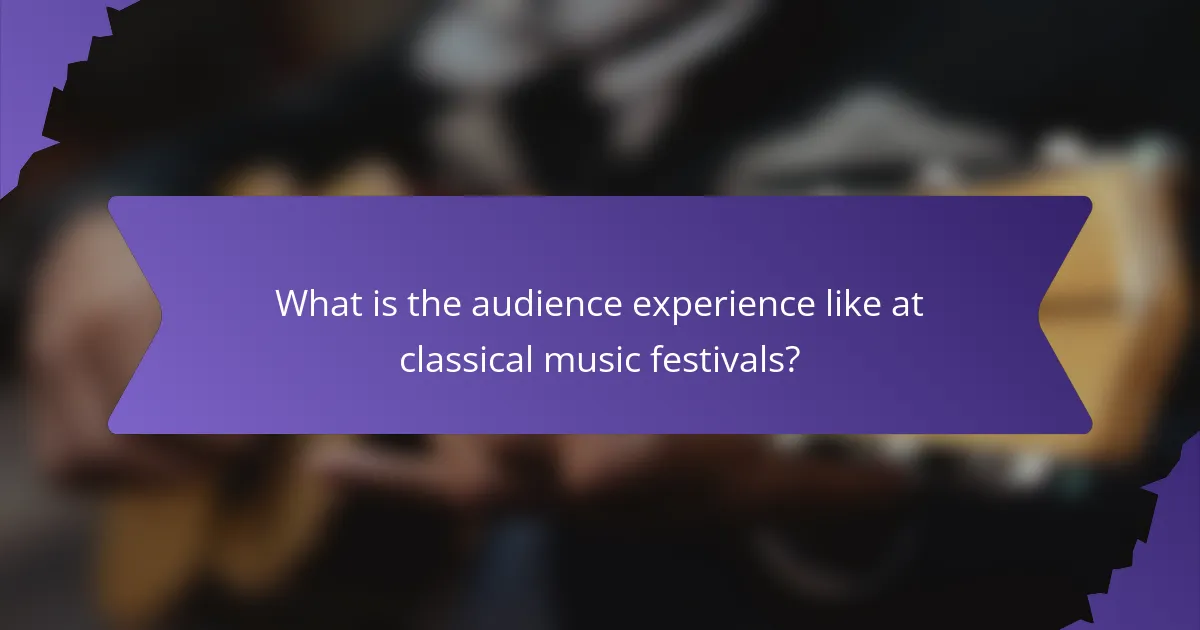
What is the audience experience like at classical music festivals?
The audience experience at classical music festivals is immersive and engaging. Attendees enjoy live performances by renowned orchestras and soloists, creating a unique atmosphere. Festivals often feature diverse programmes, allowing audiences to explore various composers and styles. Interactions with artists through Q&A sessions enhance the experience, making it memorable. Additionally, festivals may offer workshops and educational activities, appealing to both enthusiasts and newcomers. The combination of music, community, and education enriches the audience’s connection to classical music.
How do audience demographics influence festival programming?
Audience demographics significantly shape festival programming by influencing the choice of performances, marketing strategies, and overall experiences offered. Festivals often curate lineups that appeal to the age, cultural background, and preferences of their target audience. For instance, younger audiences may favour contemporary classical interpretations, while older demographics might prefer traditional compositions.
Additionally, demographic insights help in scheduling events at times that maximise attendance and engagement. Festivals may also incorporate educational elements or community outreach initiatives tailored to specific demographic groups, enhancing the audience experience. By aligning programming with audience demographics, festivals can foster a more inclusive environment and increase overall satisfaction.
What are the common challenges faced by festival-goers?
Festival-goers often face challenges such as overcrowding, high ticket prices, and weather conditions. Additionally, accessibility issues can arise for those with mobility limitations. Long wait times for food and restrooms can detract from the experience. Lastly, sound quality and visibility can vary significantly across different venues.
How does the festival atmosphere enhance the listening experience?
The festival atmosphere significantly enhances the listening experience by creating a communal and immersive environment. Audiences connect deeply with the music and performers, fostering a shared emotional journey. The outdoor settings often amplify acoustics, enriching sound quality. Additionally, visual elements like stage design and lighting contribute to a holistic sensory experience, making performances memorable.
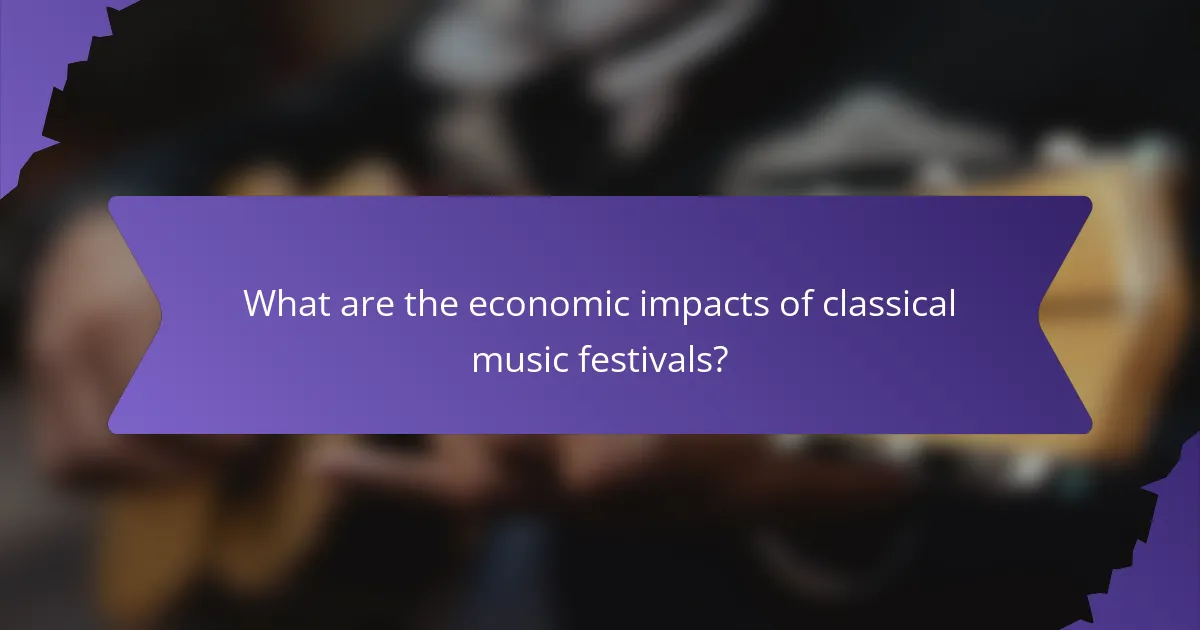
What are the economic impacts of classical music festivals?
Classical music festivals significantly boost local economies through tourism, job creation, and cultural investment. These festivals attract thousands of attendees, generating revenue for hotels, restaurants, and local businesses.
For instance, a study found that a major classical music festival can contribute over £2 million to the local economy. This includes spending on accommodations, dining, and transportation. Festivals also create temporary and permanent jobs, enhancing community employment opportunities.
Moreover, cultural investments in these festivals can lead to improved infrastructure and increased visibility for the arts. As a result, classical music festivals play a crucial role in fostering economic growth and community development.
How do festivals contribute to local economies?
Classical music festivals significantly boost local economies through tourism, job creation, and community engagement. These events attract visitors who spend on accommodations, dining, and entertainment. For instance, a major festival can generate millions in revenue, benefiting local businesses and artists. Additionally, festivals create temporary jobs and promote cultural tourism, enhancing the area’s reputation. As a result, communities experience revitalisation and increased investment opportunities.
What are the sponsorship opportunities available for festivals?
Classical music festivals offer diverse sponsorship opportunities, including stage sponsorship, programme advertising, merchandise partnerships, and exclusive event access. These options enhance brand visibility and connect sponsors with engaged audiences. Sponsorship can also include supporting specific performances or educational workshops, providing unique engagement opportunities with attendees.
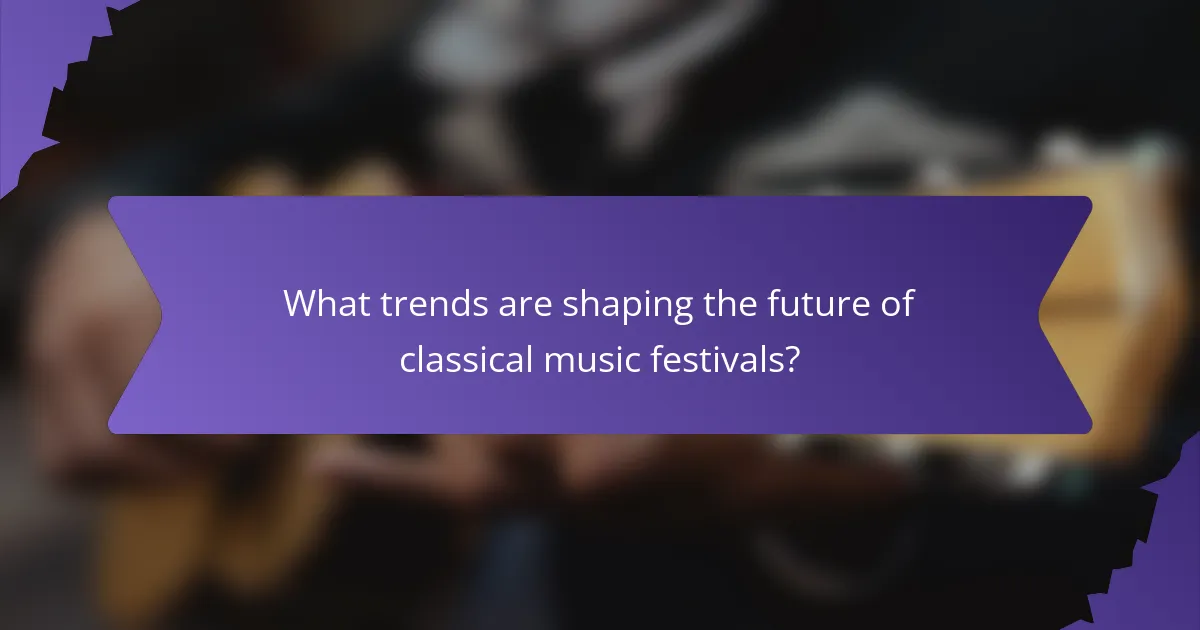
What trends are shaping the future of classical music festivals?
Emerging trends are reshaping classical music festivals, enhancing both performer engagement and audience experience. Digital integration is a significant trend, allowing festivals to reach global audiences through live streaming and virtual reality. Sustainability initiatives are also gaining traction, with many festivals adopting eco-friendly practices to reduce their carbon footprint.
Diversity in programming is increasingly prioritised, featuring a wider range of composers and genres to attract varied audiences. Interactive experiences are becoming popular, encouraging audience participation through workshops and discussions with artists. These trends collectively aim to modernise the classical music festival landscape while maintaining its rich traditions.
How is technology changing the festival experience?
Technology is enhancing the festival experience through digital engagement and improved accessibility. Live streaming allows global audiences to enjoy performances remotely. Mobile apps provide real-time information and interactive features, enhancing audience participation. Advanced sound and lighting technologies create immersive environments, elevating the overall experience. Social media platforms foster community engagement and promote events, reaching wider audiences effectively.
What role do social media platforms play in audience engagement?
Social media platforms significantly enhance audience engagement for classical music festivals. They facilitate real-time interaction, allowing audiences to share experiences and connect with performers.
Platforms like Instagram and Facebook enable live updates, promoting festival highlights and encouraging user-generated content. This interaction fosters community and enhances the overall audience experience.
Additionally, social media analytics provide insights into audience preferences, helping organisers tailor future events. Engaging content, such as behind-the-scenes footage and artist interviews, creates anticipation and maintains interest before and after festivals.
Overall, social media is a crucial tool for building relationships and enhancing engagement in the classical music festival scene.
Which sustainability practices are being adopted by festivals?
Classical music festivals are increasingly adopting sustainability practices to minimise their environmental impact. These practices include using renewable energy sources, implementing waste reduction strategies, and promoting eco-friendly transportation options.
Many festivals are now sourcing local food and beverages to support regional economies while reducing carbon footprints. Additionally, some events are incorporating digital ticketing to decrease paper waste. These initiatives align with the growing audience demand for environmentally responsible events, enhancing the overall festival experience.
What best practices can enhance the festival experience for attendees?
To enhance the festival experience for attendees, organisers should focus on accessibility, diverse programming, and engaging activities.
Accessibility ensures all attendees can enjoy the event, including those with disabilities. Diverse programming attracts a wider audience by featuring various genres and performers. Engaging activities, such as workshops and Q&A sessions, foster interaction between artists and attendees, enriching the overall experience.
Offering food and beverage options that cater to different dietary needs enhances comfort. Providing clear information about schedules and venue layouts improves navigation and reduces stress. Lastly, incorporating technology, like mobile apps for real-time updates, can elevate attendee engagement and satisfaction.